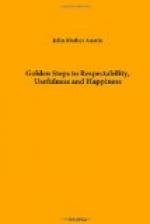want of knowledge of the organism of the human mind.
Moreover, they indicate an erroneous conception of
the inherent power of truth; and a marvellous lack
of confidence in the self-sustaining capacity of the
Christian religion. If Christianity cannot exist
and progress among men without chaining the human mind
in bondage, stifling all research, and forbidding a
critical investigation of doctrines put forth in its
name, then it must at length become extinct.
Men will and must think, reason, investigate, on religious
subjects, as well as other topics, whatever result
may follow. I cherish, however, none of these
fears. The multiplicity of denominations, and
the diversity of opinions, can work no serious injury
to religion. The discussions, researches, and
critical examinations, which necessarily grow out
of this state of things, will but sift error from
truth; and result, ultimately, in laying broader and
deeper the foundations of pure Christianity in human
society; bringing out its highest excellencies and
beauties to the admiration of men, and elevating it
far above the poisoned arrows of scepticism.
It is the errors engrafted on Christianity, in dark
and ignorant ages, that have given the infidel all
his weapons of attack. When these errors shall
at length all be detected and expunged by candid research,
and faithful investigation, the shafts of the sceptic
will fall harmless at the base of the graceful and
glorious temple of Christ’s religion. In
the words of John Milton—“Though
all the winds of doctrine were let loose to play upon
the earth, so truth be in the field, we do injuriously
* * * to misdoubt her strength. Let her and falsehood
grapple. Who ever knew truth put to the worse
in a free and open encounter?”
What line of conduct should the young adopt towards
those who differ from them on religious doctrines?
In the first place, let it never be forgotten that
others have the same civil, moral, and religious right
to differ in sentiment from you, that you have from
them. This right is recognized by our republican
government, and is sanctioned by the gospel. One
of the directions of the Saviour is, that men should
“search the Scriptures."[11] There would be
no propriety in this commandment, had not individuals
the right to understand the teachings of the Scriptures,
according to their best judgment, with the light they
possess. Moreover, Protestantism allows among
its first principles, the legitimate right of individual
interpretation of the Scriptures, and private judgment
in religious matters. It was for this right that
Luther and Zuinglius, Melancthon and Calvin, and all
the Reformers, contended against the arrogant assumption
of the Roman Church. That Church insisted that
the people were not to understand the Scriptures for
themselves, but were bound, to receive, unquestioned,
such interpretations as the bishop or priest should
teach them. Whoever deny freedom of opinion, in
regard to religion, to all men, clearly violate the
spirit of the gospel, the recognized rights conferred
by the Protestant religion, and the sanctions of our
political institutions.




